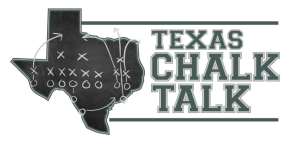UTSA’s Traylor gives insight on college football, Roadrunners’ program
CAPTION: University of Texas at San Antonio head football coach Jeff Traylor (left) and Russell Roberts, who has been a head football coach and athletic director for decades. Roberts was raised in San Antonio. Staff photo by Jennifer Fierro
Jeff Traylor, the University of Texas at San Antonio football head coach, offered some insight and observations regarding the current state of college football and how to fix some issues that will either continue to equal or return the sport to an equal playing field, depending on the viewpoints of some fans.
Traylor was the guest speaker at the Rudy Davalos Horseshoe Bay Sports Club Jan. 25 where he talked a little about his incredible career as the head coach of his alma mater, Gilmer High School, where he guided the Buckeyes to five state championship contests and won the title three times. His record was 175-26.
He also thanked former University of Texas at Austin football head coach Charlie Strong for hiring him in 2015 to coach special teams and tight ends. One year later, he was promoted to assistant head coach for offense and wide receivers head coach.
In 2017, he was the associate head coach and running backs coach at Southern Methodist University under head coach Chad Morris. When Morris became the head coach at the University of Arkansas, Traylor followed and served in the same capacity.
In 2019, Traylor became the Roadrunners’ third head coach where he has compiled a 30-10 record and guided his team to three consecutive bowls.
The Roadrunners look ready for 2023, especially since they’ll be making their debuts in the new look American Athletic Conference. UTSA has finished no worse than second in Conference USA’s West division and has won the conference championship game each of the last two years where quarterback Frank Harris was the 2022 championship game’s Most Valuable Player.
“It’s been an incredible journey,” Traylor said.
Traylor gave his thoughts and opinions on the state of college football, specifically name, image and likeness, and offered ways to use it for its original purpose — giving athletes the ability to earn income through endorsement deals.
For the record, Traylor said he is in favor of NIL, noting a full scholarship doesn’t cover money to wash clothes.
“Eighty-five percent of my kids are first-generation (college) kids,” he said. “The money they’re making is going home.”
And like most who follow college sports, he believes decision makers can do better on setting perimeters that allow athletes to make maximum dollars without hurting the programs where they became stars.
He recalled having a conversation with one of his star athletes, who kept saying “it’s a business decision,” as to why he was considering transferring.
“The transfer portal is the stupidest idea in the world,” Traylor said. “We’re in an age where a kid can leave me and go play for somebody else and be eligible immediately. As usual the adults are the ones who screwed it up. We have unrestricted free agency with no salary caps. There’s no constraints.”
One change he’d make is that academics must be a consideration when players enter the transfer portal. Most students aren’t able to transfer every credit they earned from one university to the new one. He believes that one change will influence whether a student-athlete chooses to stay or go. Credits determine how many semesters or years of eligibility a student-athlete has left.
Most point to the NFL and how it has adopted rules for free agency and a salary cap. If the NCAA were to follow that model and hire a commissioner, who would Traylor like to see in that position?
“(University of Alabama head coach) Nick Saban,” he said. “He’s 71, he’s been in it a long time. We need a person, we need somebody we can report to.”
The Roadrunners skipper has attended conventions for football coaches where they have agreed on rules, regulations and other procedures and left believing they “have fixed football” only to discover that once their recommendations go through other committees and reach the decision makers — those who vote on the rules — the language has changed.
“The words are nowhere near what we had,” he said.
The State of Texas prohibits coaches from being involved in NIL deals, he added. The only input he offered was to ask those who are paying the NIL deals, known as collectives, to tell the athletes they must strive to make the community better.
“We have very servant-oriented citizens,” he said. “They give back to the city. Ask them to perform a service where they’re giving back. I want my kids doing something for the city they serve.”
NIL is still in its infancy, and he looks forward to reading the reports after it has been around for several years.
“It’s going to be a great study in 10 years to see the men who can handle those things,” he said. “It’ll be an interesting study in a decade.”
He said he feels very blessed to have the life he has and to be able to have the career he loves at a place that wants to help students be at their best, too.
“UTSA is a very special place,” he said. “We’re in one of the greatest cities in the country. You can tell with certain people, the Lord has put their hands on them.”
Watch videos on Highland Lakes sports by going to Fierro’s YouTube channel and searching for The Broad Podcaster. Please like, subscribe and share.


